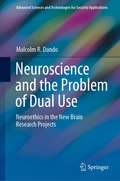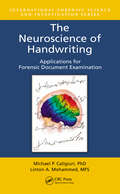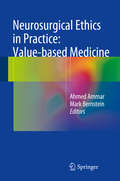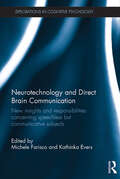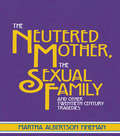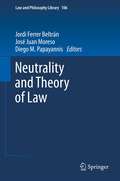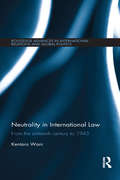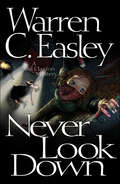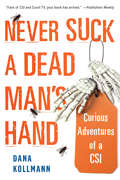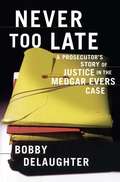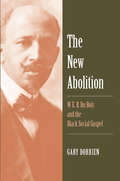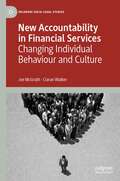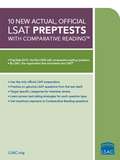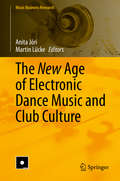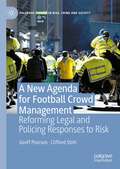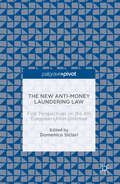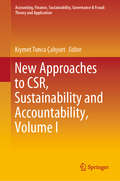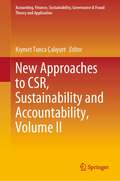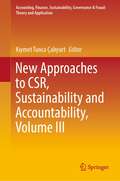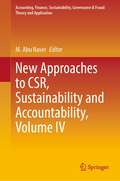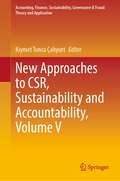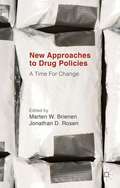- Table View
- List View
Neuroscience and the Problem of Dual Use: Neuroethics in the New Brain Research Projects (Advanced Sciences and Technologies for Security Applications)
by Malcolm R. DandoThis book discusses recent brain research and the potentially dangerous dual-use applications of the findings of these research projects. The book is divided into three sections: Part I examines the rise in dual-use concerns within various state’s chemical and biological non-proliferation regime’s during this century, as well as the rapid technologically driven advances in neuroscience and the associated possible misuse considerations in the same period. Part II reviews the brain research projects in the EU, USA, Japan, China and several other countries with regard to their objectives, achievements and measures to deal with the problem of dual-use. Part III assesses the extent to which the results of this civil neuroscience work, which is intended to be benign, are being, and could be protected against future hostile applications in the development of novel chemical and biological weapons.
The Neuroscience of Handwriting: Applications for Forensic Document Examination (International Forensic Science And Investigation Ser.)
by Michael P. Caligiuri Linton A. MohammedThe Daubert trilogy of U.S. Supreme Court cases has established that scientific expert testimony must be based on science grounded in empirical research. As such, greater scrutiny is being placed on questioned document examination generally, and handwriting comparison in particular. Bridging the gap between theory and practice, The Neuroscience of
Neurosurgical Ethics in Practice: Value-based Medicine
by Ahmed Ammar Mark BernsteinGood neurosurgical practice is based not only on evidence, skills, and modern equipment, but also on good values. This book is the first to discuss specifically the ethical issues that arise during the daily practice of neurosurgery. It is divided into three parts addressing patients' rights, ethical issues relating to the working environment, and wider societal aspects such as dealings of neurosurgeons with the legal system, the media, and companies. The authors are well-established neurosurgeons who present the ethical problems that they have encountered during their careers and explain what they have learned in confronting these problems. In all, more than 50 neurosurgical cases drawn from real life are reported and discussed from an ethical point of view. This book will be especially informative for young neurosurgeons and will provide all who work in this very special field with a road map on how to avoid violations of medical ethics in neurosurgical practice.
Neurotechnology and Direct Brain Communication: New insights and responsibilities concerning speechless but communicative subjects (Explorations in Cognitive Psychology)
by Michele Farisco Kathinka EversNeurotechnology and Direct Brain Communication focuses on recent neuroscientific investigations of infant brains and of patients with disorders of consciousness (DOC), both of which are at the forefront of contemporary neuroscience. The prospective use of neurotechnology to access mental states in these subjects, including neuroimaging, brain simulation, and brain computer interfaces, offers new opportunities for clinicians and researchers, but has also received specific attention from philosophical, scientific, ethical, and legal points of view. This book offers the first systematic assessment of these issues, investigating the tools neurotechnology offers to care for verbally non-communicative subjects and suggesting a multidisciplinary approach to the ethical and legal implications of ordinary and experimental practices. The book is divided into three parts: the first and second focus on the scientific and clinical implications of neurological tools for DOC patient and infant care. With reference to these developments, the third and final part presents the case for re-evaluating classical ethical and legal concepts, such as authority, informed consent, and privacy. Neurotechnology and Direct Brain Communication will appeal to researchers and postgraduate students in the fields of cognitive science, medical ethics, medical technology, and the philosophy of the mind. With implications for patient care, it will also be a useful resource for clinicians, medical centres, and health practitioners.
The Neutered Mother, The Sexual Family and Other Twentieth Century Tragedies
by Martha Albertson FinemanCalling for nothing less than a radical reform of family law and a reconception of intimacy, The Neutered Mother, The Sexual Family, and Other Twentieth Century Tragedies argues strongly against current legal and social policy discussions about the family because they do not have at their core the crucial concepts of caregiving and dependency, as well as the best interests of women and children. The Neutered Mother scrutinizes the definitions of family and mother throughout the volume while paying close attention to issues of race, class and sexuality. In addition, Fienman convincingly contests society's refusal to dignify, support and respond to the needs of caregivers and illustrates the burden they must bear due to this treatment. This book is a crucial step toward defining America's most pressing social policy problems having to do with women, motherhood and the family.
Neutrality and Theory of Law
by Diego M. Papayannis Jordi Ferrer Beltrán José Juan MoresoThis book brings together twelve of the most important legal philosophers in the Anglo-American and Civil Law traditions. The book is a collection of the papers these philosophers presented at the Conference on Neutrality and Theory of Law, held at the University of Girona, in May 2010. The central question that the conference and this collection seek to answer is: Can a theory of law be neutral? The book covers most of the main jurisprudential debates. It presents an overall discussion of the connection between law and morals, and the possibility of determining the content of law without appealing to any normative argument. It examines the type of project currently being held by jurisprudential scholarship. It studies the different approaches to theorizing about the nature or concept of law, the role of conceptual analysis and the essential features of law. Moreover, it sheds some light on what can be learned from studying the non-essential features of law. Finally, it analyzes the nature of legal statements and their truth values. This book takes the reader a step further to understanding law.
Neutrality in International Law: From the Sixteenth Century to 1945 (Routledge Advances in International Relations and Global Politics)
by Kentaro WaniNeutrality is a legal relationship between a belligerent State and a State not participating in a war, namely a neutral State. The law of neutrality is a body of rules and principles that regulates the legal relations of neutrality. The law of neutrality obliges neutral States to treat all belligerent States impartially and to abstain from providing military and other assistance to belligerents. The law of neutrality is a branch of international law that developed in the nineteenth century, when international law allowed unlimited freedom of sovereign States to resort to war. Thus, there has been much debate as to whether such a branch of law remains valid in modern international law, which generally prohibits war and the use of force by States. While there has been much debate regarding the current status of neutrality in modern international law, there is a general agreement among scholars as to the basic features of the traditional law of neutrality. Wani challenges the conventional understanding of the traditional neutrality by re-examining the historical development of the law of neutrality from the sixteenth century to 1945. The modification of the conventional understanding will provide a fundamentally new framework for discussing the current status of neutrality in modern international law.
Never Again: Germans and Genocide after the Holocaust
by Andrew I. PortGermans remember the Nazi past so that it may never happen again. But how has the abstract vow to remember translated into concrete action to prevent new genocides abroad?As reports of mass killings in Bosnia spread in the middle of 1995, Germans faced a dilemma. Should the Federal Republic deploy its military to the Balkans to prevent a genocide, or would departing from postwar Germany’s pacifist tradition open the door to renewed militarism? In short, when Germans said “never again,” did they mean “never again Auschwitz” or “never again war”?Looking beyond solemn statements and well-meant monuments, Andrew I. Port examines how the Nazi past shaped German responses to the genocides in Cambodia, Bosnia, and Rwanda—and further, how these foreign atrocities recast Germans’ understanding of their own horrific history. In the late 1970s, the reign of the Khmer Rouge received relatively little attention from a firmly antiwar public that was just “discovering” the Holocaust. By the 1990s, the genocide of the Jews was squarely at the center of German identity, a tectonic shift that inspired greater involvement in Bosnia and, to a lesser extent, Rwanda. Germany’s increased willingness to use force in defense of others reflected the enthusiastic embrace of human rights by public officials and ordinary citizens. At the same time, conservatives welcomed the opportunity for a more active international role involving military might—to the chagrin of pacifists and progressives at home.Making the lessons, limits, and liabilities of politics driven by memories of a troubled history harrowingly clear, Never Again is a story with deep resonance for any country confronting a dark past.
Never Far Away
by Michael KorytaNew York Times bestselling "master" of American thriller writing Michael Koryta returns with an electrifying new novel about a mother seeking to reconnect with her children after a terrible trial tears their family apartNina Morgan&’s bloodstained car was found a decade ago on a lonely Florida road. Forensic evidence suggested she&’d been murdered, although her body was never found. Her disappearance left her infant children to the care of their father. Once a pilot, mother, wife, and witness to a gruesome crime, Nina had to flee her old life to save her family. She reinvented herself as Leah Trenton, a guide in the Allagash Wilderness in northern Maine. She never expected to see her children again, but now tragedy has returned them to her—only they have no idea that she&’s their mother—and delivered all of them back into danger. &“Aunt Leah&” will need some help, and an old ally has a suggestion: an enigmatic young hitman named Dax Blackwell. Never Far Away is a thrilling collision between old sins and new dreams, where the wills and ingenuity of a broken family will be tested against all odds.
Never Let Them See You Cry: More From Miami, America's Hottest Beat
by Edna BuchananTrue stories of crime in Miami by the Pulitzer Prize–winning author of The Corpse Had a Familiar Face. Set against the neon backdrop of the South Florida city where Miami Herald reporter Edna Buchanan covered the police beat for nearly two decades, this memoir collects true tales of both heroes and villains—from the heartbreaking to the heartwarming to the outright hilarious. &“A flurry of cases—of criminal Christmases, historic crimes, homicidal love, cop heroes, rescuers, odd occurrences (such as that of the barbiturate-soaked gunman who took 26 direct hits from cops&’ guns and kept shooting until a 27th round took him down) . . . a generous bonanza for crime buffs, presented by one of the sharpest writers in the field.&” —Kirkus Reviews
Never Look Down: A Cal Claxton Oregon Mystery (Cal Claxton Mysteries #3)
by Warren C Easley"Lawyer Cal is an appealing knight in rusty armor, seeking justice for the most vulnerable...Easley exquisitely captures Portland's flavor, and his portrayal of street life is spot-on. Readers of John Hart and Kate Wilhelm will delight in trying a new author." —Library JournalIn his first case in private practice, Oregon lawyer Cal Claxton came to the aid of a tagger calling himself Picasso, a Banksy-like figure in Portland. Dividing his time between a wine-country town and the city, the ex-L.A. prosecutor now encounters another urban teen at risk, Kelly Spence, also a tagger. Using climbing skills learned from her much-loved deceased father, a mountaineer, Kelly places angry tags in visible, hard-to-reach places. A runaway from an abusive foster home and alternative high school student, she lives with her father's former girlfriend.Kelly is four stories up at 3:00 one morning when she looks down and witnesses the brutal murder of a woman in the parking lot below. Unluckily the killer spies her but Kelly escapes. The police soon seek her as a witness. Desperate to stay anonymous, she seeks help from someone on the street she trusts. Too soon she finds his mutilated body and becomes even more afraid.Cal is drawn into the case by his volatile Cuban friend and landlord who is devastated by the murder: the dead woman had just become his fiancée. Her ex is the obvious suspect, but Cal's instincts lead him in a different direction where he will run into Kelly. Can he get her to talk, or will the killer find her first?
Never Suck a Dead Man's Hand: Curious Adventures Of A Csi (Crime Scene Ser.)
by Dana Kollmann"Informative, witty. . . Kollmann delivers terse commentary and gory detail while puncturing common misconceptions about forensics. " --Booklist Step past the flashing lights into the true scene of the crime with this frank, unflinching, and unforgettable account of life as a crime scene investigator. Whether explaining rigor mortis or the art of fingerprinting a stiff corpse on the side of the road, Dana Kollmann details her true, unvarnished experiences as a CSI for the Baltimore County Police Department. "Riveting. " --M. William Phelps, author of Murder in the Heartland Unlike the popular crime dramas proliferating on today's television networks, these forensic tales forgo glitz for grit to show what really goes on. Kollmann recounts stories that the cops and the CSI's usually leave in the field, bringing the sights, smells, and sounds of a crime scene alive as never before. "Raw and real. " --Connie Fletcher, author of Every Contact Leaves a Trace Unveiling the process and science of crime scene investigation in all its can't-tear-your-eyes-away fascination, Never Suck a Dead Man's Hand takes you into the strange world behind the yellow tape, offering a truly eye-opening perspective on the day-to-day life of a CSI. "Gritty, witty, and heartfelt . . . a must-read. " --Aphrodite Jones, New York Times bestselling author of A Perfect Husband
Never Too Late
by Bobby DelaughterIn June 12, 1963, Mississippi's fast-rising NAACP leader Medgar Evers was gunned down by a white supremacist named Byron De La Beckwith. Beckwith escaped conviction twice at the hands of all-white Southern juries, and his crime went unpunished for more than three decades. Now, from Bobby DeLaughter, one of the most celebrated prosecutors in modern American law, comes the blistering account of his remarkable crusade in 1994 finally to bring the assassin of Medgar Evers to justice. This is the fascinating, real-life story of the assistant district attorney -- played by Alec Baldwin in Rob Reiner's Ghosts of Mississippi -- who brought closure to one of the darkest chapters of the civil rights movement. When the district attorney's office in Jackson, Mississippi, decided to reopen the case, the obstacles in its way were overwhelming: missing court records; transcripts that were more than thirty years old; original evidence that had been lost; new testimony that had to be taken regarding long-ago events; and the perception throughout the state that a reprosecution was a futile endeavor. But step by painstaking step, DeLaughter and his team overcame the obstacles and built their case. With taut prose that reads like a great detective thriller, Never Too Late is a page-turner of the very highest order. It charts the course of a country lawyer who, concerned about the collective soul of his community and the nature of American justice in general, dared to revisit a thirty-one-year-old case -- one so incendiary that everyone warned him not to touch it -- and win a long-overdue conviction. DeLaughter's success in this trial stands today as a landmark in the annals of criminal prosecution, and this bracing first-person account brings the saga to life as never before.
The New Abolition
by Gary DorrienThe black social gospel emerged from the trauma of Reconstruction to ask what a "new abolition" would require in American society. It became an important tradition of religious thought and resistance, helping to create an alternative public sphere of excluded voices and providing the intellectual underpinnings of the civil rights movement. This tradition has been seriously overlooked, despite its immense legacy. In this groundbreaking work, Gary Dorrien describes the early history of the black social gospel from its nineteenth-century founding to its close association in the twentieth century with W. E. B. Du Bois. He offers a new perspective on modern Christianity and the civil rights era by delineating the tradition of social justice theology and activism that led to Martin Luther King Jr. "
New Accountability in Financial Services: Changing Individual Behaviour and Culture (Palgrave Socio-Legal Studies)
by Joe McGrath Ciaran WalkerThis book is a critical examination of recently introduced individual accountability regimes that apply to the financial services industry in the UK (SMCR) and Australia (BEAR and the forthcoming FAR), together with a forthcoming new individual accountability regime ( in particular, SEAR) in Ireland. It provides a framework for analysing whether these regimes will achieve behavioural change in the financial services industry. This book argues that, whilst sanctioning individuals to deter future misconduct is an important part of any successful regulatory strategy, the focus should be on ensuring that individuals in the financial services industry internalise the norms of behaviour expected under the new regimes. In this regard, the analysis in this book is informed by criminological theory, regulatory theory and behavioural science. The work also argues for a “trajectory towards professionalisation” of financial services, and banking in particular, as an important means of positively influencing industry-wide norms of behaviour, which have a key influence on firms’ and individuals’ behaviours.
New Actual, Official LSAT Preptests with Comparative Reading
by Law School Admission CouncilThis essential LSAT preparation tool encompasses PrepTest 52 (the September 2007 LSAT) through PrepTest 61 (the October 2010 LSAT).
The New Age of Electronic Dance Music and Club Culture (Music Business Research)
by Martin Lücke Anita JóriThis book offers a comprehensive overview of electronic dance music (EDM) and club culture. To do so, it interlinks a broad range of disciplines, revealing their (at times vastly) differing standpoints on the same subject. Scholars from such diverse fields as cultural studies, economics, linguistics, media studies, musicology, philosophy, and sociology share their perspectives. In addition, the book features articles by practitioners who have been active on the EDM scene for many years and discuss issues like gender and diversity problems in general, and the effects of gentrification on club culture in Berlin. Although the book’s main focus is on Berlin, one of the key centers of EDM and club culture, its findings can also be applied to other hotspots. Though primarily intended for researchers and students, the book will benefit all readers interested in obtaining an interdisciplinary overview of research on electronic dance music.
A New Agenda For Football Crowd Management: Reforming Legal and Policing Responses to Risk (Palgrave Studies in Risk, Crime and Society)
by Geoff Pearson Clifford StottThis book provides a holistic and interdisciplinary focus on the legal regulation and policing of football violence and disorder in Britain. Anchored in ground-breaking ethnographic and participant-action research, the book combines a crowd psychology and socio-legal approach to critically explore the contemporary challenges of managing football crowds. It sets out the processes by which football disorder occurs and the limitations of existing approaches to policing ‘football hooliganism’, in particular the dominant focus on controlling ‘risk supporters’, before setting out proposals for fundamental reforms to both law and policing. This book will be of value to academics, students, legal and policing practitioners, as well as policy-makers. The two authors are internationally known experts in the management and behaviour of football crowds and bring together for the first time over 30 years of research in this area from the disciplines of law and social psychology.
The New Anti-Money Laundering Law
by Domenico SiclariThis book introduces andcontextualizes the revised and strengthened legislation on the laundering ofcriminal funds mandated by the European Union on the 20th May 2015. The authors provide fresh and new insight into the EU's fourth directive2015/849, with a specific focus on topics such as: beneficial ownership andeffective transparency, the risk-based approach, the issue of supervision ofpayment institutions that operate across borders by agents, the new method ofrisk assessment, tax crimes inclusion in "criminal activity" definition, andthe effects of new rules on the gambling sector. The authors present the newlaws in the context of their legal genealogy and demonstrate the benefits theybring in raising the standards for anti-money laundering regulation andcounter-terrorism financing. The book's comprehensiveexploration of this new legislation will appeal to policy-makers, students andacademics hoping to understand the changes more clearly.
New Approaches to CSR, Sustainability and Accountability, Volume I (Accounting, Finance, Sustainability, Governance & Fraud: Theory and Application)
by Kıymet Tunca ÇalıyurtThis book provides a platform for discussing the challenges that organizations face in order to implement sustainability, ethics, and effective corporate governance, all of which are important elements of “standing out” from other companies. Examining the background of the New European Consensus on development with the new guiding motto ‘Our World, Our Dignity, Our Future’, the authors explore how this new legislation on sustainability issues around the world is forcing companies to deal directly with sustainability issues. The 2030 Agenda for Sustainable Development (2030 Agenda), adopted by the United Nations in September 2015, is the international community’s response to global challenges and trends in connection with sustainable development. With the Sustainable Development Goals (SDGs) at its core, the 2030 Agenda is a transformative political framework designed to eradicate poverty and achieve sustainable development globally. It balances the economic, social and environmental dimensions of sustainable development, including the key issues of governance and peaceful and inclusive societies, and recognizes the essential interlinkages between its goals and targets, i.e., that they must be implemented as a whole and not selectively. The respective chapters in this volume raise a number of questions regarding companies’ ability to implement sustainability, ethics, and effective corporate governance. Simultaneously, they explore how organizations must adapt to sustainability-related developments.
New Approaches to CSR, Sustainability and Accountability, Volume II (Accounting, Finance, Sustainability, Governance & Fraud: Theory and Application)
by Kıymet Tunca ÇalıyurtThis book continues the discussion on the challenges that organizations face in order to implement sustainability, ethics, and effective corporate governance, all of which are important elements of “standing out” from other companies. Examining the background of the New European Consensus on development with the new guiding motto ‘Our World, Our Dignity, Our Future,’ the authors explore how this new legislation on sustainability issues around the world is forcing companies to deal directly with sustainability issues.The 2030 Agenda for Sustainable Development (2030 Agenda), adopted by the United Nations in September 2015, is the international community’s response to global challenges and trends in connection with sustainable development. With the Sustainable Development Goals (SDGs) at its core, the 2030 Agenda is a transformative political framework designed to eradicate poverty and achieve sustainable development globally. It balances the economic, social, and environmental dimensions of sustainable development, including the key issues of governance and peaceful and inclusive societies, and recognizes the essential interlinkages between its goals and targets, i.e., that they must be implemented as a whole and not selectively. The respective chapters in this volume raise a number of questions regarding corporate social responsibility, ethics, and corporate governance in the face of new technology, and new approaches to climate change and sustainability reporting.
New Approaches to CSR, Sustainability and Accountability, Volume III (Accounting, Finance, Sustainability, Governance & Fraud: Theory and Application)
by Kıymet Tunca ÇalıyurtThis book continues the discussion in the first two volumes on the challenges that organizations face in order to implement sustainability, ethics, and effective corporate governance, all of which are important elements of “standing out” from other companies. Examining the background of the New European Consensus on development with the new guiding motto ‘Our World, Our Dignity, Our Future,’ the authors explore how this new legislation on sustainability issues around the world is forcing companies to deal directly with sustainability issues.The 2030 Agenda for Sustainable Development (2030 Agenda), adopted by the United Nations in September 2015, is the international community’s response to global challenges and trends in connection with sustainable development. With the Sustainable Development Goals (SDGs) at its core, the 2030 Agenda is a transformative political framework designed to eradicate poverty and achieve sustainable development globally. It balances the economic, social, and environmental dimensions of sustainable development, including the key issues of governance and peaceful and inclusive societies, and recognizes the essential interlinkages between its goals and targets, i.e., that they must be implemented as a whole and not selectively. The respective chapters in this volume raise a number of questions regarding corporate social responsibility, ethics, and corporate governance in the face of new technology, and new approaches to climate change and sustainability reporting.
New Approaches to CSR, Sustainability and Accountability, Volume IV (Accounting, Finance, Sustainability, Governance & Fraud: Theory and Application)
by M. Abu NaserThis book continues the discussion on the challenges that organizations face in order to implement sustainability, ethics, and effective corporate governance, all of which are important elements of “standing out” from other companies. Examining the background of the New European Consensus on development with the new guiding motto ‘Our World, Our Dignity, Our Future,’ the authors explore how this new legislation on sustainability issues around the world is forcing companies to deal directly with sustainability issues.The 2030 Agenda for Sustainable Development (2030 Agenda), adopted by the United Nations in September 2015, is the international community’s response to global challenges and trends in connection with sustainable development. With the Sustainable Development Goals (SDGs) at its core, the 2030 Agenda is a transformative political framework designed to eradicate poverty and achieve sustainable development globally. It balances the economic, social, and environmental dimensions of sustainable development, including the key issues of governance and peaceful and inclusive societies, and recognizes the essential interlinkages between its goals and targets, i.e., that they must be implemented as a whole and not selectively. The respective chapters in this volume raise a number of questions regarding corporate social responsibility, ethics, and corporate governance in the face of new technology, and new approaches to climate change and sustainability reporting.
New Approaches to CSR, Sustainability and Accountability, Volume V (Accounting, Finance, Sustainability, Governance & Fraud: Theory and Application)
by Kıymet Tunca ÇalıyurtThis book continues the discussion from the first four volumes on the challenges that organizations face in order to implement sustainability, ethics, and effective corporate governance, all of which are important elements of “standing out” from other companies. Examining the background of the New European Consensus on development with the new guiding motto ‘Our World, Our Dignity, Our Future,’ the authors explore how this new legislation on sustainability issues around the world is forcing companies to deal directly with sustainability issues. The 2030 Agenda for Sustainable Development (2030 Agenda), adopted by the United Nations in September 2015, is the international community’s response to global challenges and trends in connection with sustainable development. With the Sustainable Development Goals (SDGs) at its core, the 2030 Agenda is a transformative political framework designed to eradicate poverty and achieve sustainable development globally. It balances the economic, social, and environmental dimensions of sustainable development, including the key issues of governance and peaceful and inclusive societies, and recognizes the essential interlinkages between its goals and targets, i.e., that they must be implemented as a whole and not selectively. The respective chapters in this volume raise a number of questions regarding corporate social responsibility, ethics, and corporate governance in the face of new technology and new approaches to climate change and sustainability reporting.
New Approaches to Drug Policies: A Time for Change
by Marten W. Brienen Jonathan D. RosenThe U. S. -led war on drugs has failed: drugs remain purer, cheaper and more readily available than when the war on drugs began in 1971. The drug war also has resulted in extreme levels of violence as drug traffickers and organized criminals compete for control of territory. Prohibitionist policies have destroyed the lives of millions of people as prisons warehouse drug offenders. This important volume represents an effort to map new approaches to drug policies. The contributors write from various disciplinary backgrounds and provide crucial insights on a wide-range of topics, including the gang-drug nexus, delinquency, legalization, trafficking, decriminalization, intervention programs and prison reform. This volume also provides a number of policy solutions and alternatives to the current drug strategies. Includes contributions from: Marten W. Brienen, Ted Galen Carpenter, Roger G. Dunham, Gregory Fulkerson, Betty Horwitz, Caitlin Elizabeth Hughes, Hanna Samir Kassab, Ana Maria Lobos, Bradford R. McGuinn, Fida Mohammad, Keri O'Neal, J. Bryan Page, Susan A. Phillips, Vanessa Rayan, Jonathan D. Rosen, Alex Stevens, Steven L. West, and Marcelo Rocha e Silva Zorovich.
